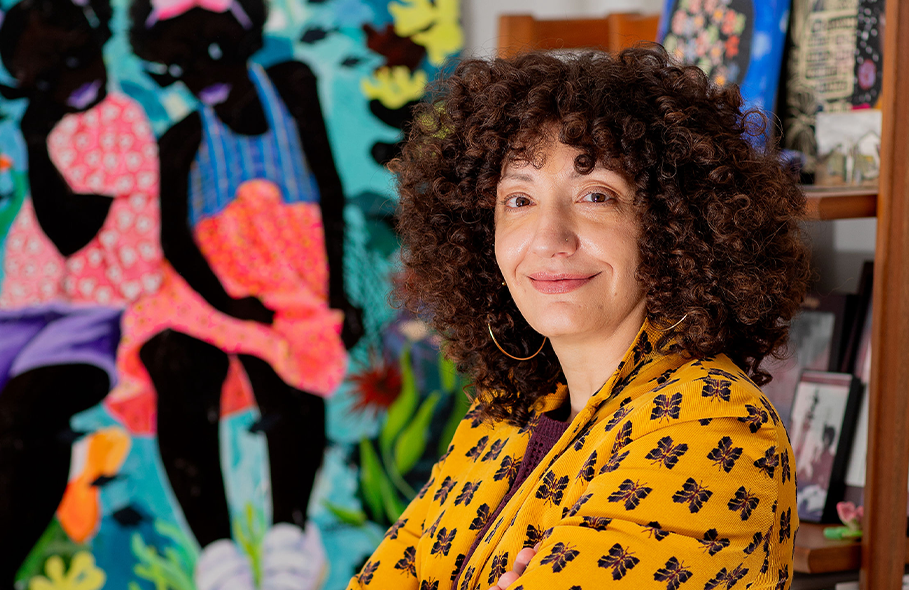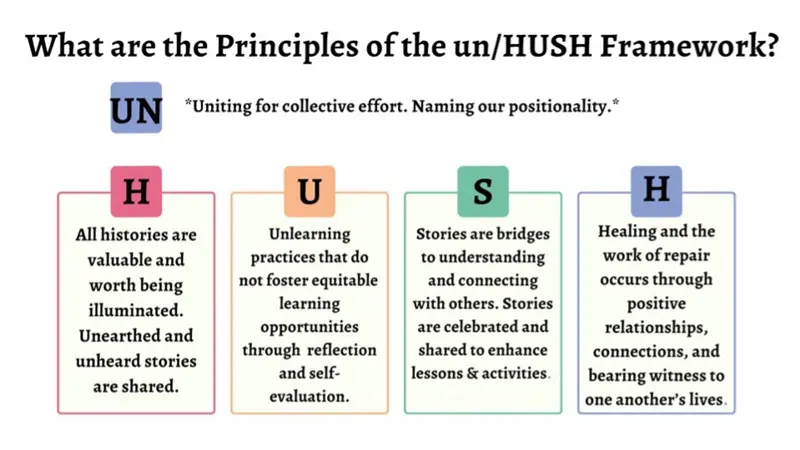'I See—and Hear—You': How to Create Culturally Responsive Classrooms
by Tom Hanlon / Mar 27, 2024

If the status quo isn’t right, Marlee Bunch is not one to stand around hoping someone else will change it.
“In my own schooling we never had inclusive texts,” says Bunch (Ed.D. ’22, Education Policy, Organization and Leadership). “We never had a focus on inclusive histories and I never had teachers who looked like me.”
So Bunch became an educator. She became a senior director of diversity and inclusion. She became a role model not only for those who looked like her, but for all her students.
And she became an author—and a rather prolific one at that.
Her books focus on giving a voice to marginalized populations, adopting culturally responsive teaching methods, covering emerging trends in education (e.g., AI in the classroom), and celebrating histories of Black female educators and of historically silenced or overlooked cultures and communities.
Giving Voice to Marginalized Populations
Bunch’s first book, due out in October 2024, is The Magnitude of Us: An Educator’s Guide to Creating Culturally Responsive Classrooms (Teachers College Press). You can find it here on Amazon.
“I wanted to address the gap that exists for educators regarding implementing culturally responsive teaching practices,” says Bunch, who earned her Ed.D. online in Diversity and Equity in Education and works with K-12 initiatives in the Office of the Chancellor at the University of Illinois Urbana-Champaign. “For too long, we have seen a gap in research and knowledge regarding the stories, voices, and histories of silenced or overlooked cultures and communities. I also recognized the need for a resource in this area for our pre-service educators.”
The Magnitude of Us will help educators navigate best practices to center historically marginalized voices and perspectives from middle school through postsecondary learning spaces. The interdisciplinary guidebook provides a blueprint for utilizing histories, culturally responsive teaching, and community responsive pedagogy to build collaborative and equitable classrooms.
And it does so using a unique framework, called un/HUSH, that Bunch created while working on her dissertation at Illinois.
“The acronym came about organically as I was reflecting on the lessons that I had learned from the incredible women I had the honor of interviewing for my research,” she says.
“Un” stands for uniting for collective effort and naming our positionality. “H” is for using previously untold histories to inform teaching practices, “U” signifies unlearning behaviors and practices that do not empower marginalized voices, “S” refers to creating classrooms and spaces that allow for stories to be shared, and “H” is for encouraging healing to occur from connection, collaboration, and relationships.

Unlearning the "Hush"
“Basically, the un/HUSH framework asks us to unlearn the ‘hush’ that is often associated with marginalized histories and stories,” says Bunch, who earned her B.A. in English Literature from National-Louis University in 2001, a Ed.M. from DePaul University in 2003, and a second Ed.M. with a gifted education certification from Emporia State University (KS) in 2012. “Culturally responsive teaching and community immersive teaching are paramount to ensuring that education is both equitable and inclusive. It’s important that students see themselves in curriculum, in texts, and in their classrooms.”
To that end, she has created a teaching guidebook that helps educators illuminate and celebrate marginalized histories in a manner that is natural, sustainable, and simple to implement through pedagogical practices.
“My research for the book entailed looking at best pedagogical practices of past educators and the ways they leveraged the community for positive results, how classrooms can better approach the trauma and grief that we know many of our students face,” Bunch notes. “I also researched the process and concept of unlearning and how the brain’s neuroplasticity allows us to relearn information and replace bias or misinformation with that new information.”
Aimed at Novice and Veteran Teachers Alike
Her book offers guidance for novice and veteran teachers, with elements specifically designed for pre-service educators. “I use histories and student voices to inform best practices for creating lessons and activities for middle school, high school, and college classrooms,” Bunch says.
Her book is being piloted this semester by a professor at Smith College, a private women’s college in Northampton, Massachusetts.
“The students have been receptive to the framework and found creative ways to use it,” she remarks. “It makes me feel as though it will truly be user-friendly and helpful.”
The time is right for culturally responsive classrooms, Bunch adds.
“I cannot think of a more pertinent time to help students discover our humanity and the aspects that make us unique and also connect us to one another,” she explains. “Culturally responsive teaching embodies the best elements of good teaching, as it asks us to move beyond the curriculum to also consider ourselves, others, and how all of that combined creates opportunities for inquiry and discovery.”
Two More Books
Bunch’s passion for her subject promises to keep her publication list growing. Her next two books are both scheduled for release in 2025. One has a working title of un/Hushed: Oral Histories of Black Female Educators in Mississippi 1954-1971 (University of Illinois Press).
“This book will contain oral histories of activists and educators, such as Mrs. Ellie Dahmer, who is the wife of slain civil rights activist Vernon Dahmer; Dr. Joyce Ladner; and others, as well as artwork, poetry, and historical vignettes,” Bunch says. “I am really proud of the collaborative effort involved with this book.”
The other book, which she is coauthoring, is tentatively titled Leveraging AI for Culturally Responsive Teaching & Social-Emotional Learning: A Classroom Practitioner's Guidebook (Routledge Press).
“My books are a labor of love,” she says. “I hope they benefit current teachers and future educators.”
Learning Cohort Forming this Fall
Bunch is creating a learning cohort for The Magnitude of Us. “Starting this fall, we’ll be meeting online to discuss curriculum and any issues related to making the most of the ideas in the book to become culturally responsive educators,” she says.
The cohort is designed for teachers who will begin their professional careers in Fall 2024 and for pre-service teachers in their last year of undergraduate studies. To learn more about the cohort, visit Bunch’s website.
Through the cohort, Bunch hopes to help budding educators the way she was helped while working on her doctorate at Illinois.
“My work at the University of Illinois prepared me to write these books,” she says. “It connected me to my mentor, helped me grow my research area and skills, and created a place for me with incredible support and guidance.”
Bunch names EPOL professors Christopher Span and Yoon Pak, associate professor Jon Hale, and teaching assistant professor Sharon Lee,along with Rod Wyatt, Office of the Chancellor, as particularly instrumental in her academic journey at Illinois.
Hopes for The Magnitude of Us
“I hope the framework allows students a space to see themselves, to share their experiences, and to make connections with other students and with classroom content,” Bunch says. “I want educators to find the support and resources they need to implement Socratic seminars, inquiry-based learning, and oral histories to allow students to speak up, to celebrate themselves and others.
“More than anything, I want my book to help educators see applicable ways to create culturally responsive classrooms. I hope it reminds educators of the power of collaboration, celebrating overlooked histories, and that teaching from a place of community and tolerance will always yield beneficial results for students.”